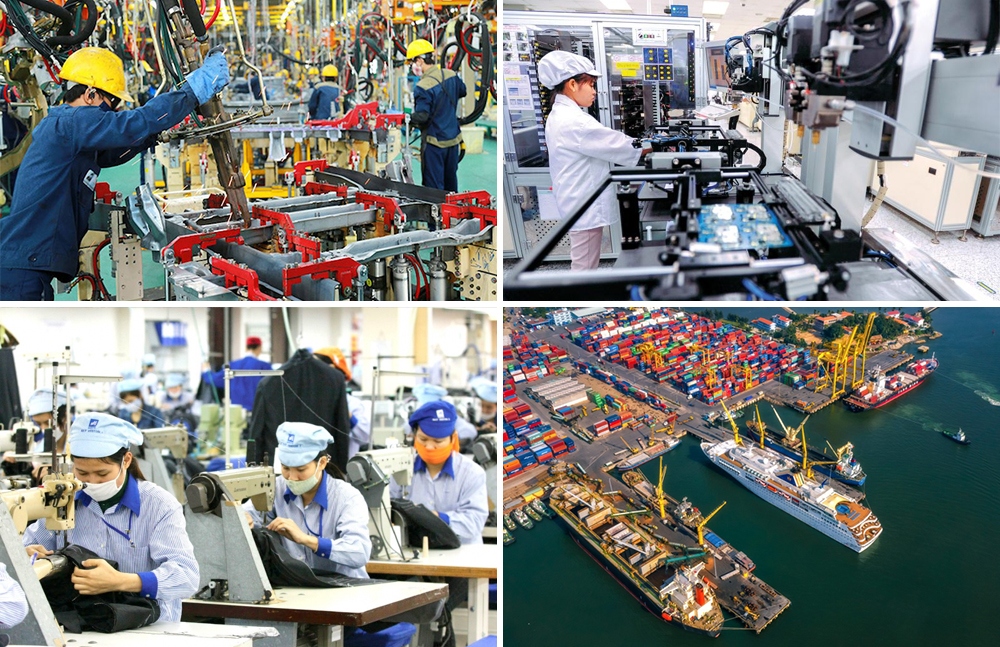Crunch time for Vietnamese economy over 30 years
VOV.VN - Vietnam is relying too much on monetary policies in order to stimulate demand. However, loosening lending standards and lowering interest rates serve to reduce asset quality, thereby creating asset bubbles, according to economic experts.
Meanwhile, underutilised fiscal tools slowed demand growth during the recession process and caused inflation during the growth period.
Most difficult time for Vietnamese economy over 30 years
As part of his address at a recent seminar held on recovery of aggregate demand aimed at promoting economic growth in the new context, organized by the National Economics University, Ass. Professor Dr. Tran Dinh Thien, former director of the Vietnam Institute of Economics, stated that despite the Vietnamese economy being open, it remains weak due to suffering from issues in the international economy and external impacts.
In addition, the internal economy has also revealed many weaknesses, both in terms of management and administration, as well as the capacity to cope with and overcome difficulties of the business community, especially small and medium enterprises.
According to Dr. Thien, the Vietnamese economy is in the midst of a particularly difficult period when facing a structural crisis and a crisis of economic mechanism, meaning it is necessary to properly identify it. Especially, after two to three years of COVID-19, Vietnamese businesses have been exhausted, while no proper policies have been adopted.
Statistics indicate that in the first half of the year, there were 75,900 newly-registered enterprises, down 0.5% over the same period from last year. Nearly 37,700 enterprises resumed operations, down 7.4%; 60,200 enterprises suspended business activities for a definite time; 31,000 enterprises stopped operating and waited for dissolution procedures, up 28.9%; and 8,800 enterprises completed dissolution procedures, up 2.8% on-year.
Dr. Thien said that enterprises withdrawing from the market is a real issue, while the rate of enterprises participating in the market is not necessarily "real", meaning that they have not yet contributed to GDP growth.
Amid the current challenges facing the Vietnamese economy, the former director of the Vietnam Institute of Economics underlined the necessary of re-identifying all structures of the national economy that are facing serious difficulties in improving its real capacity, combining domestic enterprises with weak foreign enterprises, and adjusting policy institutions.
Sharing this view, Dr. Nguyen Dinh Cung, former head of the Central Institute for Economic Management (CIEM), said that over 30 years, this is the most difficult period for the local economy.
Vietnam needs more fiscal policy tools
According to Dr. Johnathan Picus, chief economist of the UN Development Program (UNDP) in Vietnam, the nation requires more fiscal policy tools. First of all, it is necessary to overcome the situation of fragmented and inefficient public investment, which is not tied to industrial and trade policies. Along with that, the social security and welfare system must be expanded and become more modern.
The country’s fiscal deficit stands larger than official figures; the ratio of public investment to GDP decreases, becoming more and more localised; and public investment decentralisation in the country is among the highest in the world, he went on to say.
The nation therefore needs to develop a countercyclical fiscal policy which can stimulate demand during a period of declining global growth, modernise its social security system to suit middle-income countries, boost industrialisation, and ensure transparency of the fiscal policy, the UNDP expert recommended.
Assessing Vietnamese fiscal policies over recent years, Dorsati Madani, senior economist of the World Bank (WB), stated that there remains plenty of room for Vietnamese fiscal policy. Despite this, the implementation process still faces numerous challenges and requires immediate action, such as accelerating disbursement of public investment capital, improving investment procedures, and defining objectives and quality of the implementation process.
Solutions for public investment are not enough, according to the WB, the Government therefore must support workers and households affected by the shock related to the global economic slowdown, noted Madani.
Besides, Madani said that the effectiveness of the monetary policy remains limited.
The WB expert suggested that the country should quickly reform to support economic growth over the medium term, such as strengthening the capital adequacy of banks, as well as improving institutional frameworks for careful supervision and early intervention, banking and crisis management, and the regulatory framework for dealing with weak banks.
In particular, the nation needs to consolidate confidence through structural reforms as it seeks to enhance competitiveness, improve the business environment, restart the SOE reform programme, promote financial inclusion, facilitate the acquisition of skills according to market needs, and improve the medium-term adaptability of exports, she stressed.
It is therefore predicted that Vietnamese GDP will grow below 5% this year, with the recover to stand at roughly 5.5% to 6% next year, Madani added.

